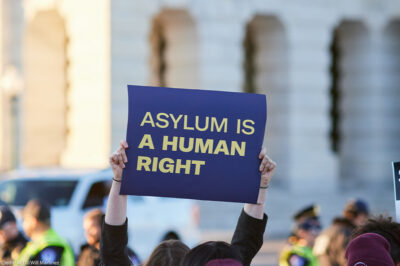ACLU Says FBI Questioning of Iraqi Nationals in U.S. Will Hamper, Not Help, War on Terror
FOR IMMEDIATE RELEASE
NEW YORK – The government’s latest plan to question thousands of Iraqi nationals is yet another example of ethnic and religious profiling that may hamper rather than help efforts to apprehend terrorists, the American Civil Liberties Union said today.
In response, ACLU offices across the country have been mobilizing to identify – and in some cases provide special training for – local attorneys to accompany Iraqis to the interviews, which are scheduled to begin this week. The ACLU expressed concern that some FBI officials have told Muslim groups that the presence of an attorney would lead them to immediately suspect that the person might “have something to hide.”
“In the same breath that they are asking for assistance from Iraqi nationals in thwarting terrorism, the FBI is alienating people by treating them like suspects and discouraging them from consulting with an attorney, which is their right,” said Dalia Hashad, the ACLU’s Arab, Muslim and South Asian Advocate.
“There are many good reasons to have an attorney present during questioning, none of which have anything to do with guilt,” Hashad said. “Further, it is unlikely that people with information will come forward when they feel that having an attorney present will render them suspicious to the government and not having an attorney present will expose them to unwarranted detention or worse.”
Hashad said that the ACLU has been fielding phone calls from frightened Iraqis, many of whom fled Saddam Hussein’s regime and are concerned that the government is targeting them for questioning merely on the basis of their country of origin.
According to news reports, the FBI is working from an initial list of about 50,000 Iraqi nationals living in the United States, about 11,000 of whom have been targeted for interviews in the event of a war. Officials have not said what the basis for the “targeting” is, although a similar interview program known as Special Registration singled out men over the age of 16 from mainly Muslim and Arab nations.
The FBI plans include setting up meetings between the heads of FBI field offices and local Islamic groups across the country to ask for their support in identifying terrorists and to assure them of FBI protection against hate crimes. While in some places, like Pittsburgh, the FBI has also met with local ACLU officials to allay fears and establish cooperation, the message from the FBI has been inconsistent the ACLU said. For example, the FBI told a Muslim group in Philadelphia that they would not be arrested for immigration violations; however an FBI official told the Washington Post on Monday that they would detain anyone found to be in violation of immigration laws.
“It is ironic that the government is promising to protect Iraqis against hate crimes, which are attacks based on a person’s ethnicity, skin color or religion – in other words, the very kind of profiling the government is resorting to,” Hashad said.
Stay Informed
Every month, you'll receive regular roundups of the most important civil rights and civil liberties developments. Remember: a well-informed citizenry is the best defense against tyranny.




